A federal grand jury recently indicted eight individuals in connection with an alleged $68 million Medicaid fraud schemeinvolving two adult social day care centers and a home health care intermediary, operating out of Brooklyn, New York. The indictment accuses the defendants of orchestrating a wide-ranging fraud that exploited essential federal health care programs intended for vulnerable seniors who need specialized care.
The indictment names Zakia Khan, Ahsan Ijaz, Ansir Abassi, Elaine Antao, Omneah Hamdi, Amran Hashmi, Seema Memon, and Manal Wasef, charging them with conspiracy to commit health care fraud, conspiracy to defraud the United States and to pay and receive health care kickbacks, among other charges. Prosecutors allege that, beginning in approximately October 2017, Khan and Ijaz owned and operated two social adult day cares, Happy Family Social Adult Day Care, Inc. and Family Social Adult Day Care, Inc., and a financial intermediary, Responsible Care Staffing, Inc., for the New York Medicaid Consumer Directed Personal Assistance Program (CDPAP). In exchange for kickbacks and bribes, marketers Antao, Hamdi, and Wasef referred Medicaid recipients to Happy Family, Family Social and/or Responsible Care. The marketers in turn allegedly paid kickbacks and bribes to Medicaid recipients for social adult day care and CDPAP services that were billed to Medicaid but were not provided or were induced by kickbacks and bribes.
U.S. Attorney Breon Peace weighed in and states that through this scheme, Medicaid, a program meant to support low-income and vulnerable individuals, had been exploited for personal gain. “Social adult day care and home health services are meant to help seniors,” said Peace. “But as alleged, the defendants turned their businesses into a brazen cash grab of millions of dollars from the Medicaid program.”
The investigation, led by the U.S. Department of Health and Human Services Office of Inspector General (HHS-OIG), Homeland Security Investigations (HSI), and the NYPD, underscores the significant public harm caused by health care fraud. Special Agent in Charge William S. Walker of HSI put it bluntly saying, “The defendants saw nothing beyond the dollar signs associated with their crimes.” The charges include conspiracy to commit health care fraud, conspiracy to defraud the United States, paying and receiving health care kickbacks, and money laundering. If convicted, they could face significant prison time—up to 20 years for some.
This case connects to longstanding concerns about fraud and misuse within t the CDPAP program, which we wrote about back in July when Governor Kathy Hochul criticized it calling it “a racket.” CDPAP allows individuals to hire family members or friends as caregivers, offering compensation for providing care and reducing the need for institutional care. Like the adult social day care centers, the CDPAP program has come under scrutiny due to allegations of abuse and lack of financial oversight. The defendants allegedly billed Medicaid for CDPAP services that were never provided. While the program’s goals are well-intended, fiscal intermediaries responsible for administrative tasks, such as payroll, have been accused of exploiting the system for financial gain.
With that said, fraud in the home health care and hospice sectors continues to be an alarming pattern. This indictment follows other high-profile cases such as Constantine Cannon’s whistleblower case against the Visiting Nurse Service of New York (VNSNY), the largest not-for-profit home health care agency in the country. VNSNY agreed to pay $57 million to settle allegations that it failed to provide critical nursing and therapy visits as prescribed in patient Plans of Care. The case, brought by our whistleblower client, marked the largest non-kickback False Claims Act settlement ever against a home health care company.
Furthermore, the sheer scale of this kind of misconduct shows how far some individuals will go to exploit taxpayer-funded programs. As this particular investigation continues to unfold, law enforcement agencies are continuing to crack down on health care fraud to protect the integrity of programs meant to serve those in need. As we see regularly, Medicaid fraud has very real, and very serious consequences. When people steal money from public funds, it depletes resources meant for vulnerable seniors and families in need. Schemes like this not only cheat the government but take away essential services from those who rely on them.
If you have knowledge of healthcare fraud, suspected violations of the Anti-Kickback Statute or Stark Law, or money laundering fraud, you can help bring justice to the forefront. Please don’t hesitate to contact our experienced whistleblower team for a free and confidential consultation.
Read $68 Million Medicaid Fraud Scheme Involving Adult Social Day Care and CDPAP Home Health Care Services Results in Eight Charged at constantinecannon.com






Leave A Comment